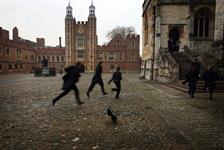A bid to set up a select committee to look at reforming the charitable and tax status of independent schools and redistributing money to the state sector has been defeated at the end of a caustic Commons debate.
Labour’s shadow education secretary, Bridget Phillipson, tabled a motion calling for the establishment of the Fair Taxation of Schools and Education Standards Committee.
She said it would look into reform to “raise funding for measures to increase educational standards across the state sector”.
These measures would include “the recruitment of new teachers, additional teacher training, and careers advice and work experience for all pupils”.
The motion, which was eventually defeated by 303 votes to 197, divided the chamber along Conservative and Labour lines.
But this is unlikely to mean the end of the political debate on the issue.
Labour leader Sir Keir Starmer has repeatedly made it clear that he would remove charitable status from independent schools if he became Prime Minister.
Introducing the proposal yesterday, Phillipson said: “Labour believes that excellence is for everyone – excellence for every child, in every school, in every corner of our country.
“I ask honourable members to support that ambition by establishing a new select committee to consider how to end the inexcusable tax breaks that private schools enjoy and invest that money in driving up standards across all our state schools.”
She said VAT on private school fees would raise at least £1.7bn.
Phillipson added that the current “tax advantage allows the wealthiest in this country, indeed the very wealthiest on the globe, to buy a prestige service that secures their children a permanent positional edge in society at an effective 20 per cent discount. How can this be justified?”
Education secretary Gillian Keegan said: “Under this government, schools will not need tax changes to receive extra money; they will not have to wait. Without that policy, they will be getting it from April this year, and even more – £2bn, as opposed to an optimistic £1.75bn.”
She added: “The proposals do not make financial sense; they do not make sense to parents and they certainly do not make sense to children in the sector. The Labour Party’s policy is the politics of envy.
“In this government, we do not have to level down to level up; I am not somebody who resents other people’s opportunity.”
Education select committee chair Robin Walker (Con) said: “The net financial impact of raising the cost of independent education is likely to have a negative impact on the cost of state education, because it will drive up demand for places in a very constrained secondary sector.”
Brendan Clarke-Smith (Con) added: “What we have today is all about ideology. It is not a pragmatic approach and it fails to understand how our school education system actually works.
“To stick VAT on school fees and end charitable status would have a devastating effect on the independent sector. This is very much an attack on aspiration itself.”
Emma Hardy (Lab) said it was “utter nonsense” to suggest that removing charitable status from independent schools would cause them to “suddenly close”.
Alex Cunningham (Lab) agreed, saying: “I know there are parents who make sacrifices to send their children to private schools – we have heard examples of this from Conservative members – and I admire them for it, but that is their choice.
“It does not mean that schools should be subsidised by the taxpayer when some state schools are shrinking or closing because they have insufficient numbers.”
